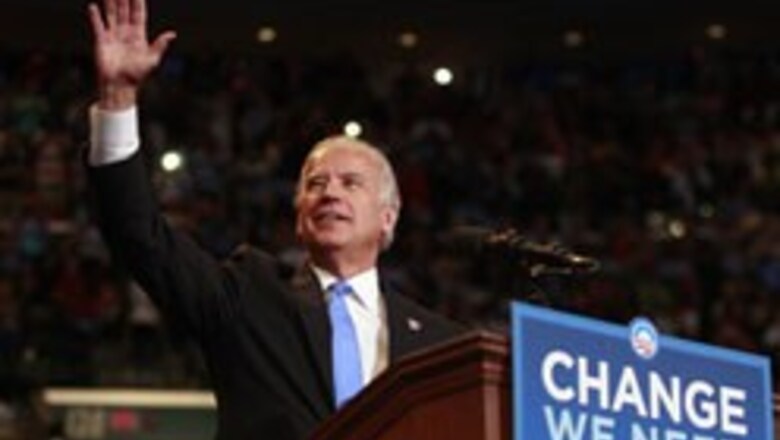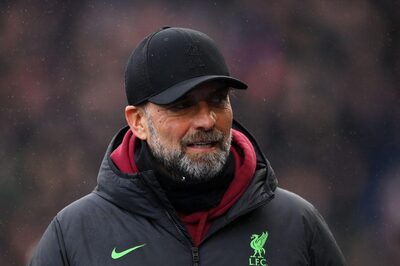
views
Washington: If Joe Biden becomes vice president, expect to hear variations of this from his boss every now and then: What Joe meant to say was ...
The Delaware senator has played to type in the campaign. He was charming when it most counted, in his debate with Sarah Palin.
He was an agile advocate of policy on the stump, with a grounding in foreign and domestic affairs honed over more than three decades in politics.
With a sharp tongue, he took the fight to Republican presidential nominee John McCain, as vice presidential picks are often expected to do.
"John McClain," he called his old friend across the political divide, muddling his name to make the point that the McCain he once knew had become someone else.
And yes, Biden put his foot in his mouth more than once. It was always a question of when, not if.
"Rhetorical flourishes," was Barack Obama's polite way of saying his running mate has a tendency to drift off the script.
On one occasion, Biden asserted that Franklin Roosevelt comforted Americans on television before TV was invented. And he made a precautionary landing of his helicopter in an Afghan snowstorm sound like an encounter with terrorists.
That's just Joe, his colleagues would tell you. But Obama himself had to step in, gently, when Biden told supporters that America's foes would generate a crisis to test Obama in the first six months of his presidency.
"I think that his core point was that the next administration is going to be tested regardless of who it is," Obama said, by way of translating Bidenspeak. "I think that Joe sometimes engages in rhetorical flourishes."
Collegial yet ideological, the Delaware senator brought a wealth of foreign policy experience to Obama's Democratic ticket, plus wisdom in the ways of Washington and an infectious enthusiasm for political donnybrooks.
Back in his hometown of Scranton, Pennsylvania, Biden's Catholic schoolmates nicknamed him Dash because he stuttered so much his speech sounded like Morse Code. Biden overcame that rip at his confidence, smoothed his talk and doesn't seem to have quieted down since.
He came to Washington as a wunderkind, elected to the Senate in 1972 at age 29 — the earliest possible age — and just meeting the rule that one must be 30 when sworn in. The knock against him used to be that he was more sizzle than steak, articulate but perhaps not all that deep.
At age 65, as a party elder and veteran of titanic judicial nomination struggles, world crises and legislative dealmaking, that rap has faded.
His hearings as chairman of the Senate Foreign Relations Committee are historical soliloquies on the fly, complete with grace notes liberally dispensed to colleagues and witnesses of any political persuasion, humor often directed at himself and plenty of fulmination over what he sees as the failures of the Bush administration.
His first presidential campaign, in 1987, was a "train wreck" by his own description, one of those times that forced him to pick up pieces and start anew.
He'd lifted lines from a British politician, exaggerated his academic achievements when boasting about his smarts to a voter who challenged him ("I have a much higher IQ than you do, I suspect," Biden recalls saying) and suffered horrendous headaches that turned out to be caused by life-threatening brain aneurisms that kept him out of the Senate for seven months.
"In the aftermath I had to remake my health, my reputation, and my career in the Senate," he writes in his memoirs. And that was not the worst of his shattering episodes — not even close.
PAGE_BREAK
On December. 18, 1972, five weeks after Biden was elected to the Senate, his wife Neilia, infant daughter Naomi and sons Beau and Hunt were out in the family station wagon getting a Christmas tree when a tractor-trailer broad-sided them.
Down in Washington, Senator-elect Biden was using Senator Robert Byrd's spacious office that day — his own first office was so small that anyone inside it had to stand up and move to let the door open.
Biden's sister Val took the phone call.
"There's been a slight accident," she said, chalk white.
"She's dead, isn't she?" Biden recalls saying, meaning his wife.
Neilia and Naomi died in the crash. The boys were critically injured. Biden said he did not find this out for sure until he flew to Delaware and arrived at the hospital.
Biden came to understand how suicide could be seen not just as an option "but a rational option."
He devoted himself to the care of his sons — ages 2 and 3 at the time — and was sworn in at the bedside of one of them. Both recovered fully, growing up to become lawyers.
As a single father, Biden committed himself to the Delaware tradition of its US senators coming home every night. A 100-mile (160-kilometer) trip by road, his commute is by Amtrak, and he's been a fixture on the morning and night trains for all these years.
He still will not work on December 18, the date of the accident.
In 1977, Biden married Jill Tracy Jacobs. They have a grown daughter, Ashley.
Biden does not talk often of the tragedy but decades later, anything to do with the welfare of his children still rankles — and explains perhaps his sharpest rebuke of Obama as well as Hillary Rodham Clinton in this year's primary campaign.
Captain Beau Biden, a member of the Delaware National Guard and the state's attorney general, had been preparing for deployment to Iraq, and it did not sit well with his father that Obama and Clinton had at times voted against money for the war.
"There's no political point worth my son's life," Biden snapped. "There's no political point worth anybody's life out there. None."
Beau Biden left in early October for training in Texas and deployment to Iraq with the 261st Signal Brigade. His dad spoke at the brigade's departure from Delaware — briefly.
He told the audience his son had advised him: "Dad, keep it short. We're in formation."
PAGE_BREAK
Biden led Judiciary Committee proceedings in the explosive debates that rejected the Supreme Court nomination of Robert Bork in 1987 and approved Clarence Thomas in 1991.
He earned the ire of conservative activists in the Bork hearings, only to be criticized by liberals later for sending the Thomas nomination to the Senate floor without, in their view, fully investigating Anita Hill's allegations of sexual harassment by Thomas.
Reflecting on the Thomas-Hill hearings, Biden said personal accusations should be handled in closed sessions. "We could have the Lord Almighty be nominated and someone in this country will communicate to the committee something negative about that person."
Biden counted a law to protect women from violence and his push to end genocide in the Balkans as the two matters that redeemed the lost promise of his first presidential campaign.
PAGE_BREAK
Biden's second presidential campaign faltered early; he was just one of the Democrats shunted to the sidelines as the bracing contest between Obama and Clinton dominated everything.
He dropped out after finishing poorly in Iowa, the opening contest.
He proved to be a cheerful campaigner who mixed easily with voters, got along with rivals and displayed a self-deprecating humor that leavened debates and speeches.
When the longwinded senator was asked if he could reassure voters he had the discipline needed on the world stage, he drew laughs with a rare one-word answer: "Yes."
When they were still rivals, Obama jumped in to defend the Delaware senator on another occasion, when Biden was asked if he had a problem with minorities.
The question was rooted in Biden's occasional gaffes. He had apologized earlier for describing Obama as "articulate" and "clean" in one unguarded episode that was taken by some to have a racial overtone.
And he'd had to defend his remark that "you cannot go to a 7-Eleven or a Dunkin' Donuts unless you have a slight Indian accent."
Biden's high-pressure act in the general campaign was his debate with Palin, which required him to be neither hostile nor condescending to the Alaska governor and national policy neophyte.
By all but the most partisan accounts, he succeeded on that score — and no translation was required from the boss.




















Comments
0 comment